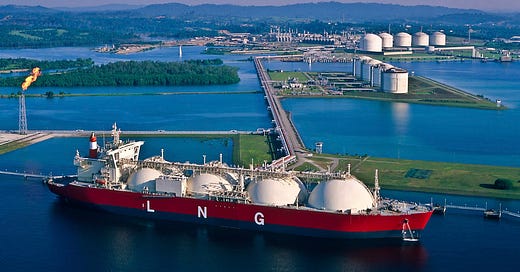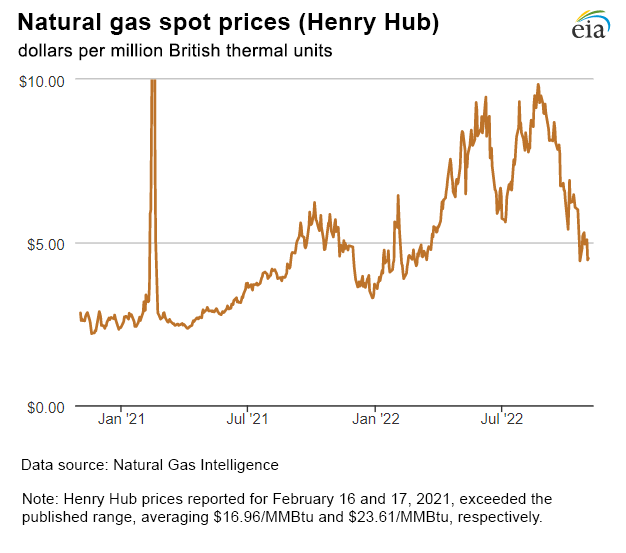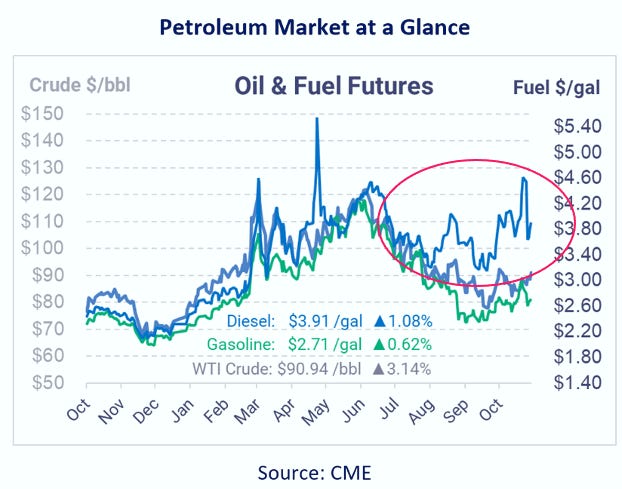The Gathering Storm Pt 3: How the war affects the US
In Part 3 of Ad Astra’s Russo-Ukraine War series, we discuss how the situation in Europe affects average Americans
Don’t miss Part 1
Tl;dr
· The war in Ukraine has caused the price of natural gas, crude oil, and diesel to spike in the US
· The US and European economies are interconnected and a downturn in Europe will spread to the US
· The Ad Astra Editorial Board recommends the war be brought to a negotiated peace because 1) it hurts US citizens, 2) it risks uncontrolled escalation, 3) the US has achieved significant strategic objectives, and 4) it strengthens the Russia-China axis
· The future of US foreign policy is at the crossroads of liberal internationalism and restrained nationalism; the war in Ukraine does not advance US interests in either scenario
Introduction
I own a modest single-story home in Jacksonville, FL and in 2022, my utility bill has increased every month. I got curious and calculated the increase to be 30% from January through October. Jacksonville Electric Authority, my utility, owns four local natural gas power plants and the cost of that fuel has gone up dramatically this year.
Figure 1: My 2022 electric utility bills
Likewise, there is a gas station next to my neighborhood and I’ve been watching the prices this year. While the price of Regular Unleaded gasoline has come down from peaks this summer, its still very high versus last year. I don’t use diesel fuel, but I’ve watched it stay at summer peaks and not follow gasoline prices back down. It’s currently $1.68 more than gasoline per gallon.
Figure 2: Gas station prices near my house November 3, 2022
Energy Shocks in America
In Part 2 of this series, Ad Astra discussed three energy product price spikes as a result of the war in Ukraine: natural gas, crude oil, and diesel fuel. Since energy markets are global, all three of these shocks affect the US.
Natural gas
We have seen how curtailed Russian natural gas led to increased prices in Europe in Part 2. The substitute for that gas has been Liquified Natural Gas (LNG) from America. Natural gas is compressed and chilled to -260F into a liquid and loaded onto specialized ships at LNG export terminals. From there, it is floated across the Atlantic and re-gasified in European LNG import terminals, which are connected to the European natural gas grid.
Figure 3: US LNG export terminals[i]
In the near-term, this has caused significant pain for US consumers as prices have increased dramatically in 2022 (Figure 4) as the US sends LNG to Europe. This is most acutely felt in electricity bills, as natural gas is the primary electricity generation fuel.
Figure 4: US natural gas prices[ii]
Longer-term, the price of US natural gas will subside as drilling in the US responds to high prices and increases. The US has multiple Saudi Arabia’s worth of natural gas under its soil, which will make it a natural gas exporting superpower for decades or longer. This will give the US tremendous geopolitical leverage over Europe (and probably elsewhere too). It will globalize US natural gas prices, so in the future US consumers will more directly feel the impact of world events in the prices they pay, much like oil today. The US becoming a gas exporting superpower is one of the many reasons that the US is not in decline, and its best days are ahead.
Figure 5: Future expansion of US LNG export capacity[iii]
Crude oil
Part 2 discussed how the global supply of crude oil is at risk in three ways: 1) Western sanctions curtail Russian oil output, 2) Russian exports fall as a result of infrastructure damage or technical incompetence and 3) Putin uses oil as a weapon and cuts exports, causing the price to spike. Oil is traded on a global market, so all these factors have impacted petroleum product prices the US. This pain is felt most acutely by consumers in gasoline prices. Prices have receded some from peaks this summer, but are still much higher than in 2020 and 2021. Higher energy prices also contribute to high inflation, discussed in Ad Astra’s first post.
Figure 6: US oil and fuel prices (2021-2022)[iv]
Diesel
Part 2 discussed how the EU ban on importing Russian diesel and reduced refining capacity in Europe have caused diesel prices to spike on the continent. Similar to natural gas, the US has filled the gap and exported significant amounts of diesel to Europe. This has led to high US diesel prices that have not come down from summer peaks (Figure 7). Because most freight trucks run on diesel, this additional shipping cost has hit US consumers through wide-ranging inflation.
Figure 7: US oil and fuel prices (2021-2022)[v]
Likewise, it has resulted in record low inventories (at one point the US only had 25 days of diesel remaining).
Figure 8: US diesel (distillate) inventories[vi]
European-US Economic Interconnectedness
The US and Europe are economically interconnected, so a downturn in Europe would hurt the US economy. In 2008, the US exported its housing crisis to Europe. In 2022, a recession in Europe will likely spread to the US (and the rest of the world). The worse things get in Europe, the worse they will be in the US.
Figure 9: US trade with EU[vii]
Recommended Action
Ad Astra makes an effort to be objective and balanced. Everything so far has been unopinionated and factual. What follows is the Ad Astra Editorial Board’s recommended action. It is an opinion.
The US should facilitate a negotiated peace between Russia and Ukraine. The US has tremendous leverage over Ukraine and without our aid, the war could not continue. We can continue providing aid to Ukraine, but we should condition it on coming to the negotiating table with Russia.
There are 4 major reasons to end this war:
1. Continued war hurts the US middle class and the global economy
2. Uncontrolled escalation, including nuclear, is more likely the longer the war continues
3. The US has already achieved its primary strategic goals
4. The war strengthens the Russia-China axis
First, as illustrated in this article and Part 2, this war has created tremendous economic costs across the world. Furthermore, any benefit to US interests from degrading Russia is vastly outweighed by the economic costs borne by average Americans. This is especially true given that Russia’s military has been revealed to be incompetent and not a serious threat.
Second, the risk of this conflict spilling over to potentially include a US-Russia shooting war is not worth any benefits from continued conflict. WW1 began as a relatively minor regional dispute before interlocking security guarantees (like NATO) dragged the entire world into war. The world saw how easily this could happen when the AP erroneously reported that Russian missiles crossed into Poland, killing two (the missiles actually came from Ukraine). A nuclear escalation, no matter how improbable, would be catastrophic and needs to be taken off the table.
Third, the US has already achieved its primary strategic objectives for the war. It has bled Russia at a very low cost, destroying roughly half of Russia’s conventional forces with less than 6% of the US defense budget[viii]. Russia is no longer a global power that can meddle around the world. America has also hooked Europe on US LNG, giving it tremendous geopolitical leverage, and separated Russia and Europe economically permanently.
Finally, long-term this war pushes Russia closer to China, the US’ number one geopolitical enemy. It has been longstanding US policy not to allow the consolidation of the Eurasian landmass to a hostile alliance. That is why Nixon went to China in the 1970s: to flip them against the Soviet Union. Russia is already building pipelines and other economic infrastructure on its eastern border with China.
But negotiations cannot be unconditional. First, the negotiators must be realistic that Putin is a really bad guy. He is ex-KGB and cannot be trusted to follow any agreement without robust enforcement. Getting to the top in Russia is like getting to the top in the mob, he’s ruthless but rational and will adhere to an agreement if it’s in his interest to do so.
Second, the current stance by Ukraine is no territorial concessions, including Crimea, which Russia annexed in 2014. There has to be some compromise, or else any peace proposal will be a non-starter.
Finally, a negotiated peace can’t let Russia regroup and advance further. Russian forces have been revealed to be weak and ineffective. While this may seem to be a good thing, if Russian forces ever advanced onto NATO territory they would be crushed and Russia would be forced to use nuclear weapons to avoid a humiliating retreat. This extremely dangerous scenario must be avoided by forcing Russian forces to withdraw to pre-invasion positions and creating a demilitarized zone.
Longer-term, we need to restore relations with Russia in order to turn them against China. This may not be possible with Putin, but at his age of 70 and the average Russian male lifespan of 73, statistically we won’t have to wait long for someone else.
Americas Role in the World?
Not since WW2 have there been two, credible competing visions for America’s future role in the world. In general, mainstream Democrats offer liberal internationalism while MAGA Republicans offer restrained nationalism. Liberal internationalism has been US policy for most of the twentieth century and entails the promotion of democracy and liberal values abroad as US foreign policy. Its proponents argue support for human rights, free trade, and other liberal values make the world a safer place; a world led by the US is a better one. You have to go back to the nineteenth century to see restrained nationalism practiced by the US, when foreign intervention was more restrained and all foreign policy decisions were made by prioritizing American citizen’s interests. Its proponents argue that we should always put the homeland first; take the world as it is, not as we want it to be. The conflict comes just as America decides its future role in the world, offering a real-world scenario to apply to abstractions likeliberal internationalism and restrained nationalism. While that debate is worthwhile, a Chinese-Russian strategic alliance does not advance US interests in either future. So regardless of your views on foreign policy, bringing the Russo-Ukrainian War to an end is essential.
Russian Roulette
Online betting markets have evolved in recent years as good predictors of world events. One market gages the odds that “a nuclear weapon is launched in combat by the end of 2023”. The market is currently trading at 13%. Those are similar odds to a bullet being in the chamber during Russian Roulette.
Are you willing to play Russian Roulette?
[i] EIA
[ii] EIA
[iii] EIA
[iv] CME
[v] CME
[vi] @JKempEnergy
[vii] EPRS
[viii] Semafor














